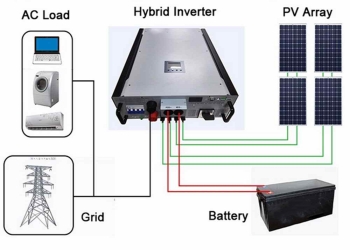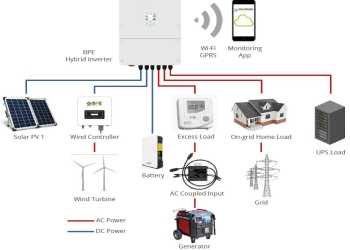What is the difference between a hybrid inverter and a standard inverter?
The hybrid inverter is an inverter that combines multiple power conversion technologies. It uses advanced power electronics technology and control strategies and has the advantages of high efficiency, high power density, and low noise. With the popularity of renewable energy and electric vehicles, power electronics play an increasingly important role in our lives. Inverters, one of these devices, play a crucial role in various power applications by converting DC power into AC power or vice versa. However, in the field of power electronic equipment, hybrid and ordinary inverters are two different products, each with unique advantages and applicable scenarios. So, what exactly is the difference between the two?

Features of hybrid inverter
The hybrid inverter is an innovative power electronic device that uses advanced power electronics technology and control strategies to achieve high efficiency, high power density, and low noise. The most significant feature of this inverter is that it adopts a parallel or series circuit structure, allowing it to handle various input voltages and frequencies.

The advantages of hybrid inverters are mainly reflected in the following aspects:
1) Flexibility: Hybrid inverters can adapt to different input voltages and frequencies, making them more flexible when facing complex application scenarios. Whether an extensive power system or electric vehicle charging, hybrid inverters can easily do the job.

2) Efficient and stable: Because the hybrid inverter uses advanced power electronics technology and control strategies, it has higher power conversion efficiency and stability. This kind of inverter will experience relatively slow performance degradation when running for a long time or facing complex application scenarios.
3) Reduced costs: While the initial purchase cost of a hybrid inverter may be higher than that of a conventional inverter, the total cost of ownership is likely to be lower than that of a traditional inverter in the long run due to its long life and stability.
4) Applicable scenarios: Hybrid inverters are suitable for procedures that need to handle multiple different input voltages and frequencies, such as large power systems, electric vehicle charging, etc. It has become an ideal choice for electric vehicle charging systems, especially in electric vehicles because it can simultaneously convert DC and AC power.
Characteristics of ordinary inverters
An ordinary inverter is a traditional inverter that usually has only one or a few fixed voltage and frequency outputs. This type of inverter has the advantage of being lower cost and easier to maintain but may need more stability when handling many different input voltages and frequencies.
The advantages of ordinary inverters are mainly reflected in the following aspects:
1) Cost: The cost of a regular inverter is usually lower because it does not use advanced power electronics technology and control strategies. This makes it highly cost-effective in some specific application scenarios.
2) Easy maintenance: Since the circuit structure of ordinary inverters is relatively simple, it is relatively easy to maintain. When a problem occurs, it usually only requires replacing the corresponding component or performing a simple repair.
3) Applicable scenarios: Ordinary inverters are suitable for some specific and relatively simple application scenarios. For example, they charged batteries or gave power to small electronic devices. In these scenarios, the performance of ordinary inverters can meet the needs, and the cost is relatively reasonable.
Summarize
In general, hybrid and ordinary inverters each have advantages and applicable scenarios. Based on actual needs and budget, we must decide which type of inverter to use. With the continuous development of power electronics technology, future power conversion equipment will be more efficient, reliable, and flexible. Whether hybrid or ordinary inverters, they bring convenience and efficiency to our lives while driving the development of power electronics technology forward.
Supplier
PDDN Photoelectron Technology Co., Ltd. is one of the leading enterprises in the Home Accessory and Solar Power System, which is fully involved in developing the power industry, intelligent operation and maintenance management of power plants, solar panels, and related solar products manufacturing. We will be committed to providing users with high-quality, efficient products and considerate service.
It accepts payment via Credit Card, T/T, West Union, and Paypal. PDDN will ship the goods to customers overseas through FedEx, DHL, by sea, or by air. If you want a high-quality hybrid inverter, please send us inquiries; we will be here to help you.
